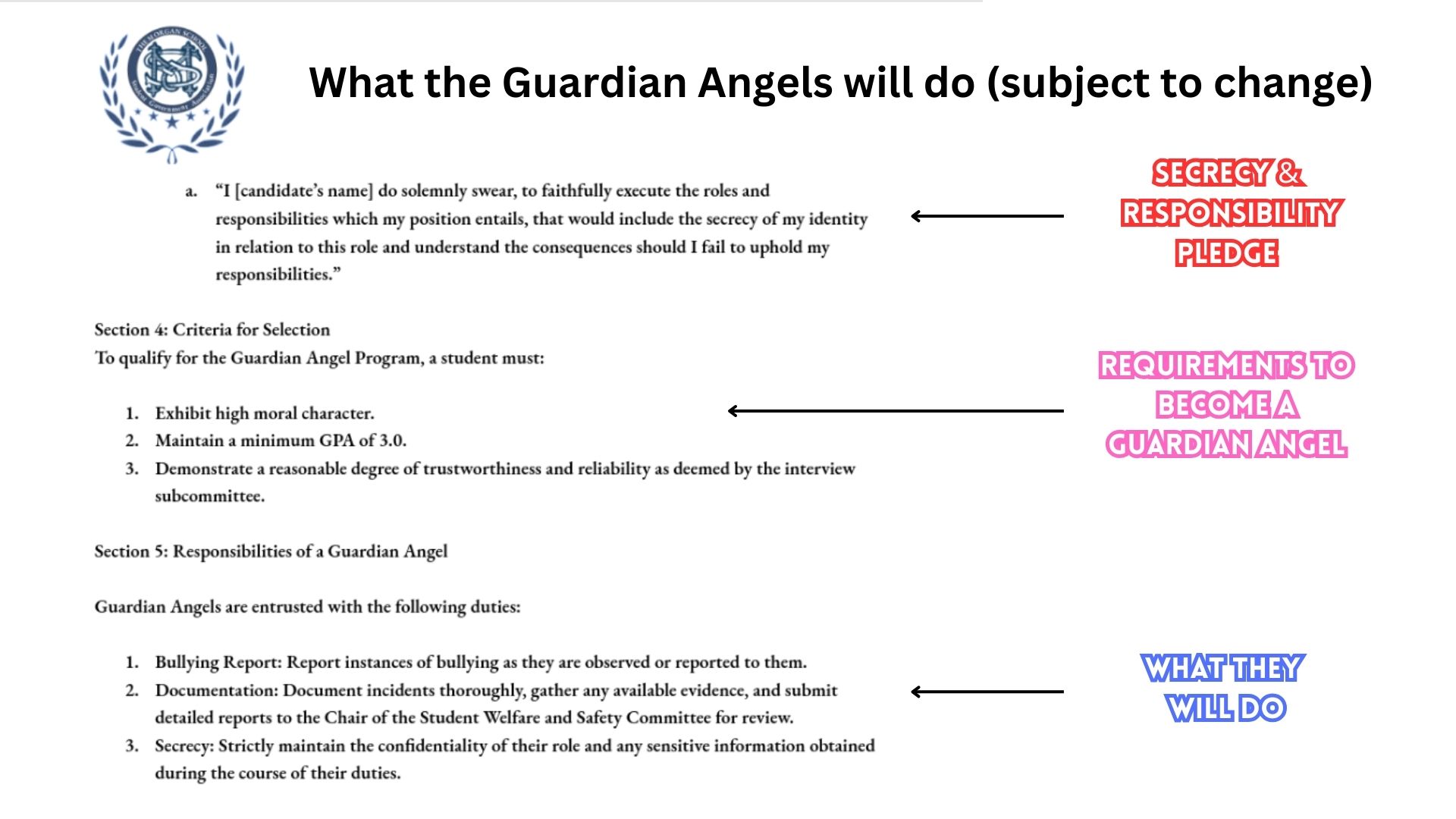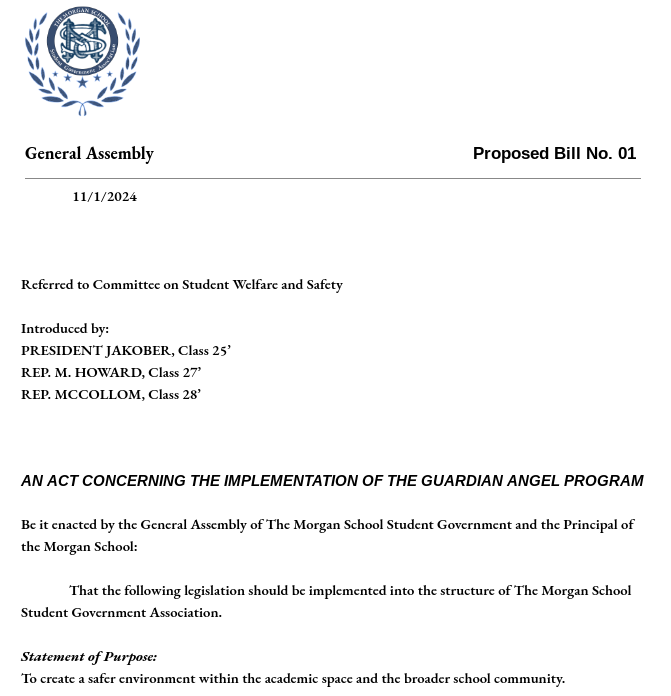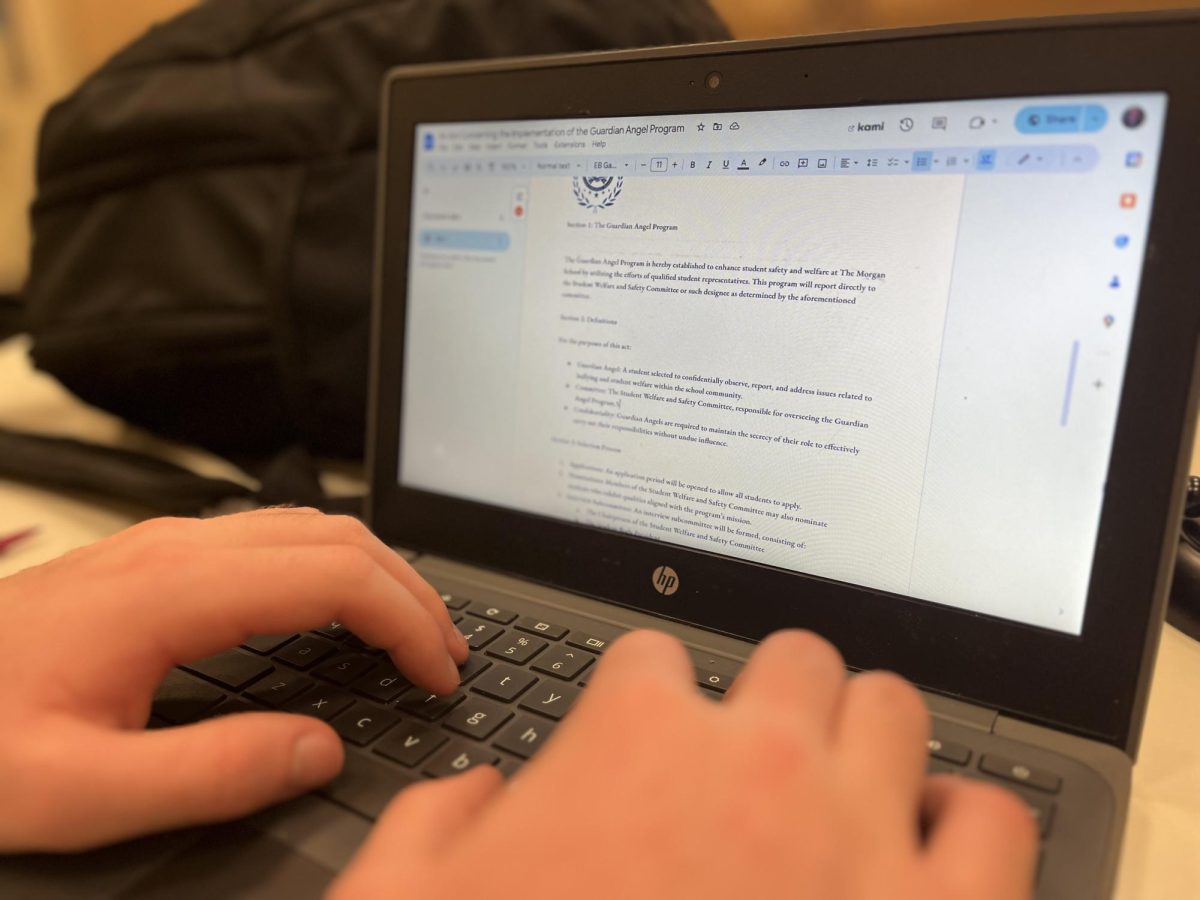For many students at The Morgan School, bullying has always been something they feared. But the Student Welfare and Safety Committee hopes to curve that with their latest drafted bill, regarding the guardian angels program – a program aimed to stop bullying by empowering students to report bullying. As the bell rings, there’ll be a new sense of security. Students chosen as guardian angels will be watching, ready to report any wrongdoing they witness, all in the name of safety.
Roughly two weeks ago on October 29th, 2024, one of the student government committees, the Student Welfare and Safety Committee, met in the large conference room at the Henry Carter Hull Library. This was their second meeting, and they discussed issues amongst student mental health and bullying. When it came to the topic of how to solve bullying, Student Body President, senior Mason Jakober, suggested a program used in Nantucket Public Schools – The Guardian Angel Program.
The program has a very simple goal: limit bullying and supply an outlet for victims of such who may feel emotional distress. “The program is designed to ensure the safety and welfare of all students. Students will be selected to be guardian angels who take on that role of monitoring and ensuring the safety and welfare of all students, which would include students who are misbehaving… and those students who are victims of that,” stated Jakober. “Guardian angels will monitor the halls, monitor classrooms, and ensure that they can look out for students who aren’t really confident enough to report things themselves or stand up for themselves.”
The program, if enacted, will be overseen by the student led Student Welfare and Safety Committee, consisting of twelve members. In terms of volume, guardian angels will be selected from the academic members of the student body, with a goal of 8.5% of the student population (about one student per classroom) serving in this role. The mission is to mitigate bullying by ensuring that students know they are being watched and that there are consequences for bullying behavior. In the event a guardian angel sees bullying, they would report issues they witness, and submit detailed reports to the Student Welfare and Safety Committee. Reports would then be handled by the committee, which decides whether the issue needs to be escalated to the administration for further action.

No one but Jakober, the program organizers/administration, or Charlotte Racho, the chairwoman of the Student Welfare and Safety Committee, would know the guardian angel’s identities. Not even guardian angels would know who their fellow guardian angels are. This is all in part to assure they are faithful to their roles, and bullies cannot avoid them. “They are elected by our organizers and kept anonymous to ensure their safety and the integrity of the program,” said Racho. “Guardian Angels who reveal their identity or fail to perform their duties may be removed from their position.”
In the sense of who can be a guardian angel if the bill is passed, anyone can apply. Students would apply through a form to become guardian angels by submitting applications and undergoing rigorous interviews. Once selected, they will undergo training on how to effectively monitor and report bullying or misbehavior. Guardian angels would gather evidence (such as testimonies, timestamps, or recordings) to substantiate claims of bullying, then create reports using a provided template. “We would release an application form… then there would be a lot of intense interviews,” said Jakober. “They’d go through an interview, and if they’re deemed fit by the interviewers (organizers of the program), then they’d be awarded the nomination, and would eventually serve in that position.”
Head of the guidance department, Nicholas Grasso, has a measured stance on the program. This is important to the program organizers, as the bill for the guardian angels program needs to be passed through guidance before heading to administration. “If the students are well-trained, they know what their role is, they know what the limits are of their role…then it could be good, but there could be issues with this as well,” stated Mr. Grasso. “The general concept of supporting one another, encouraging one another, helping one another be the best version of themselves…is a great thing, you know, for our community.”

However, the opinions of the students are mixed. Many students feel that this program will create distrust amongst the student body, and may be an invasion of their privacy. Jakober is aware of this, stating, “the guardian angels might go a little bit too far in invading their privacy… people are concerned that the guardian angels might report things just for fun.”
Junior student and student body secretary, Hernika Singh, expressed her concerns regarding the bill, stating, “I think firstly, it puts too much pressure on the chosen students as the consequences of the peers who find out they are in those roles would be too harsh and would be too hard to fix. The requirements are too harsh, and the GPA requirement should not be necessary because there should be a different amount of people and different types of people who have varying perspectives.” For Singh, although bullying often goes undetected, there isn’t a current solution that helps stop bullies. Including punishment. However, many students believe this program could be an extremely beneficial one to have in the school.
A sophomore here at the Morgan School, Aydin Faraci, said, “I feel like this program could really help with that. A lot of bullying causes bad things to happen where people will hurt themselves.” Faraci also emphasized, “I’d say as long as it doesn’t, like, cut into searching the students’ lockers or backpacks or, like, going into the bathroom,” which highlights the desire amongst students for this program to value their privacy.
Another junior, Alex Annicelli, expressed how he believes it is a good program to implement, stating, “I think trying it out would at least be, like, a good idea. If it does get implemented, I hope it goes well.” He goes on to further add, “it could help a lot with, like, some of the more, like, pestering kids in the school.” Annicelli also mentions many concerns he has with this program, and believes other students may feel somewhat the same way as him. “I feel like that could also lead to, like, kids potentially being more creative with, like, hiding their bullying, maybe resorting to online.” It was then discussed how an online outreach platform for students to the program organizers could prove useful. “It would solve the cyberbullying problem with, like, ‘oh, so-and-so is being mean to me online,’” said Annicelli.
This program has both its pros and its cons. With the student government pushing for the bill to pass, and Jakober saying, “this is likely the most important bill student government is trying to pass during my time here.” there is no doubt that the pressure and controversy is on. Only time will tell if this program will help the student body, or create distrust. If the program gets implemented to the school, it will be publicly announced to all students and parents.


